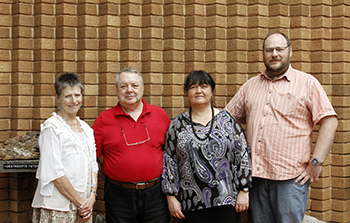Latest News Archive
Please select Category, Year, and then Month to display items
12 October 2020
|
Story Arina Engelbrecht
|
Photo Supplied
 Arina Engelbrecht from Organisational Development and Employee Well-being believes physical activity has a number of benefits for one’s health, including stress relief.
Arina Engelbrecht from Organisational Development and Employee Well-being believes physical activity has a number of benefits for one’s health, including stress relief.
Being physically active plays a big role in preventing the development of mental-health problems and in improving the quality of life of people experiencing mental-health problems.
Treatment for depression
Physical activity can be an alternative treatment for depression. It can be used as a stand-alone treatment or in combination with medication and/or psychological therapy. It promotes all kinds of changes in the brain, including neural growth, reduced inflammation, and new activity patterns are formed that promote feelings of calm and well-being. It releases endorphins – powerful chemicals in the brain that energise your spirit and make you feel good.
Physical activity can be very effective in relieving stress. Research in adults has found that physically active individuals tend to have lower stress levels compared to individuals who are less active. It also leads to improved sleep. When a person sleeps better and feels more rested, overall quality of life improves. They cope better with daily life stressors.
Reduce Alzheimer's risk
Regular physical activity can reduce your risk of developing Alzheimer's disease by up to 50%. It can also slow down further deterioration in those who have already started to develop cognitive problems. It stimulates the brain’s ability to maintain old connections as well as to make new ones.
A study asked people to rate their mood immediately after periods of physical activity (e.g. going for a walk/run, cycling, doing housework) and periods of inactivity (e.g. reading a book or watching television). Researchers found that participants felt more content, more awake, and calmer after being physically active compared to after periods of inactivity.
In conclusion, people who are physically active feel a sense of well-being, feel more energetic throughout the day, sleep better at night, have sharper memories, and feel more relaxed and positive about themselves and their lives.
“Being physically active not only changes your body, it changes your mind,
attitude, and your mood.” – Arina Engelbrecht
Famous mineralogists visit UFS Geology
2017-04-25

From the left: Prof Marian Tredoux, Associate
Professor at the UFS Department of Geology;
Prof Giorgio Garuti; from the University of Leoben,
Dr Federica Zaccarini, also from the
University of Leoben and Dr Freddie Roelofse,
Head of the Department of Geology at the UFS.
Photo: Rulanzen Martin
Years of academic friendship and collaboration is what makes Prof Giorgio Garuti and Dr Federica Zaccarini return to the University of the Free State (UFS) every so often.
The world-renowned academic duo from the University of Leoben in Austria were guest lecturers at the UFS Department of Geology. “We are here because we have known Professor Marian Tredoux and the Geology Department, for a long time. We are really happy to be here, and to be given the opportunity to present talks,” said Dr Zaccarini. The two are experts in platinum-group element mineralogy and each has given their surname to minerals namely, the Garutiite and Zaccariniite minerals.
Visit great advantage for research
They are acclaimed experts on very small minerals (smaller than a hundredth of a millimetre) with emphasis on platinum group elements in chrome-rich rocks. “Their visit is a great advantage for us. We also conduct research on these minerals and can learn from them,” said Prof Marian Tredoux, affiliated researcher at the Department of Geology.
Dr Zaccarini gave a lecture on Chromitites, and associated platinum-group elements, in ophiolites on Wednesday 5 April 2017 and Dr Garuti presented a lecture on Uralian-Alaskan complexes: a puzzling source of platinum, on Thursday 6 April 2017. During the talks they examined the association of the platinum-group minerals with chromite, rather than sulphide, and how this association can lead to the formation of unusual platinum-group element ores.
Collaboration on various academic papers
They and Prof Tredoux have collaborated on various research articles over the past four years, which have been published in various important international scientific journals. “These journals play an important role in calculating the H-scale which measures how important a researcher’s work is on an international scale,” said Prof Tredoux.